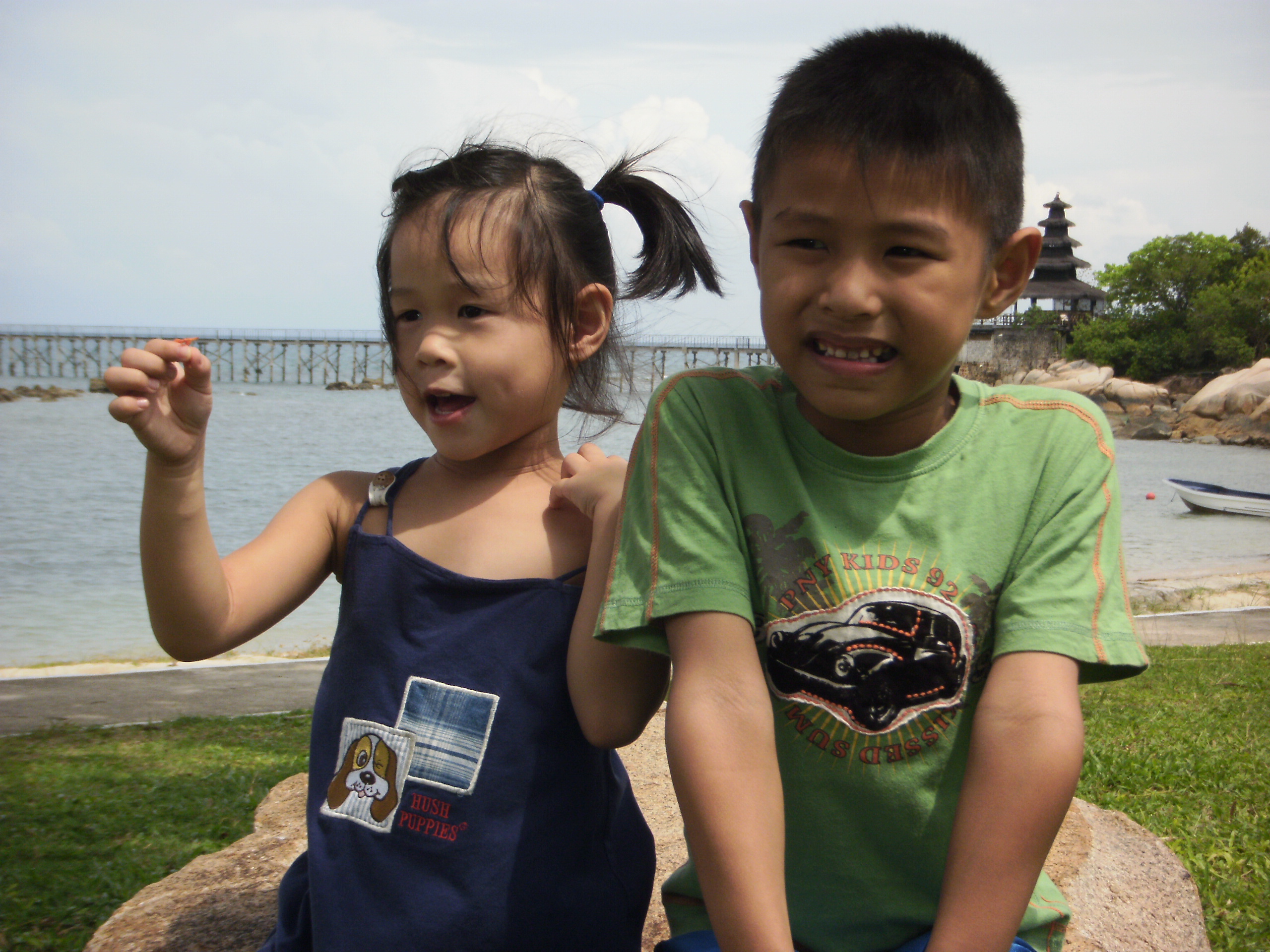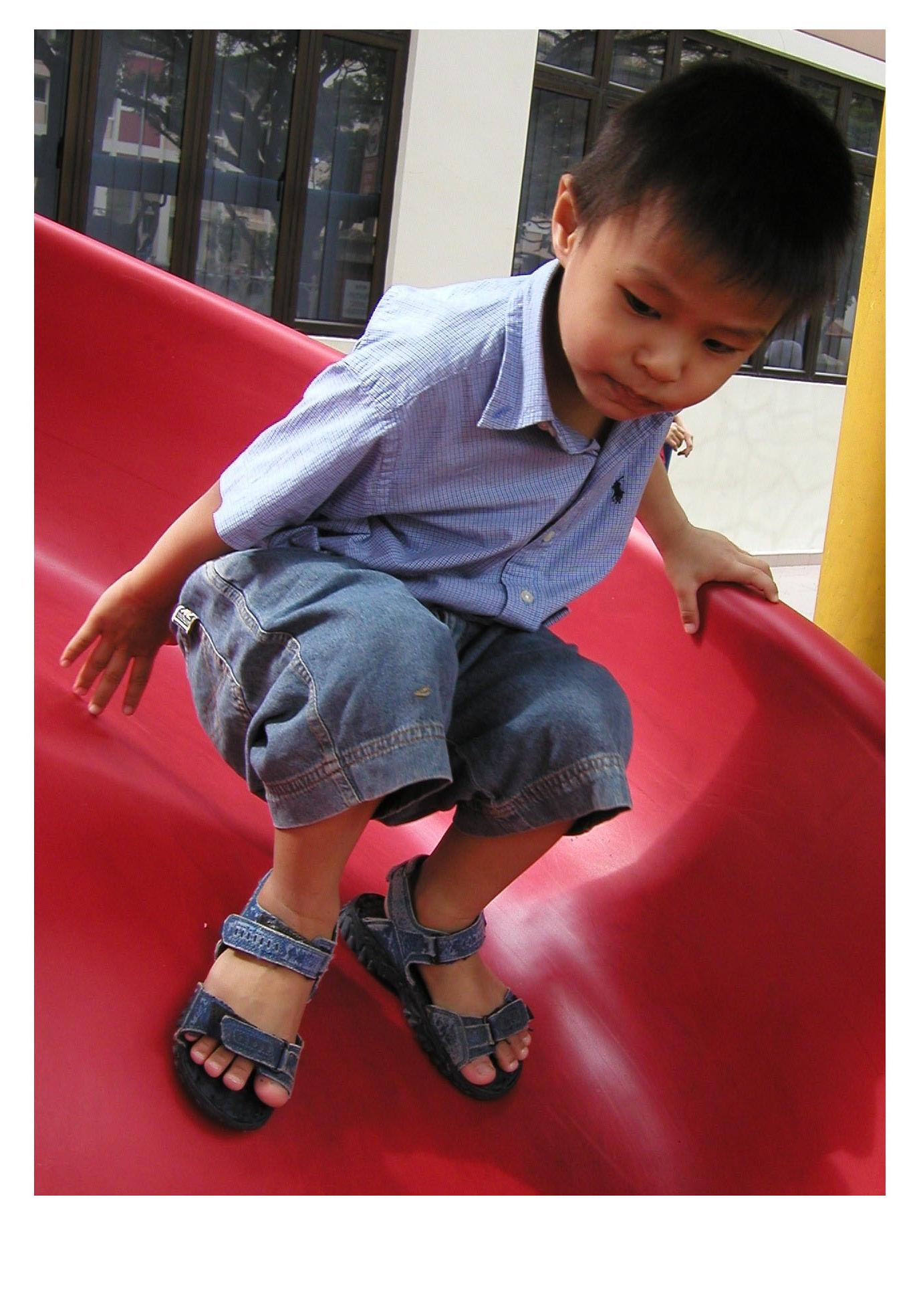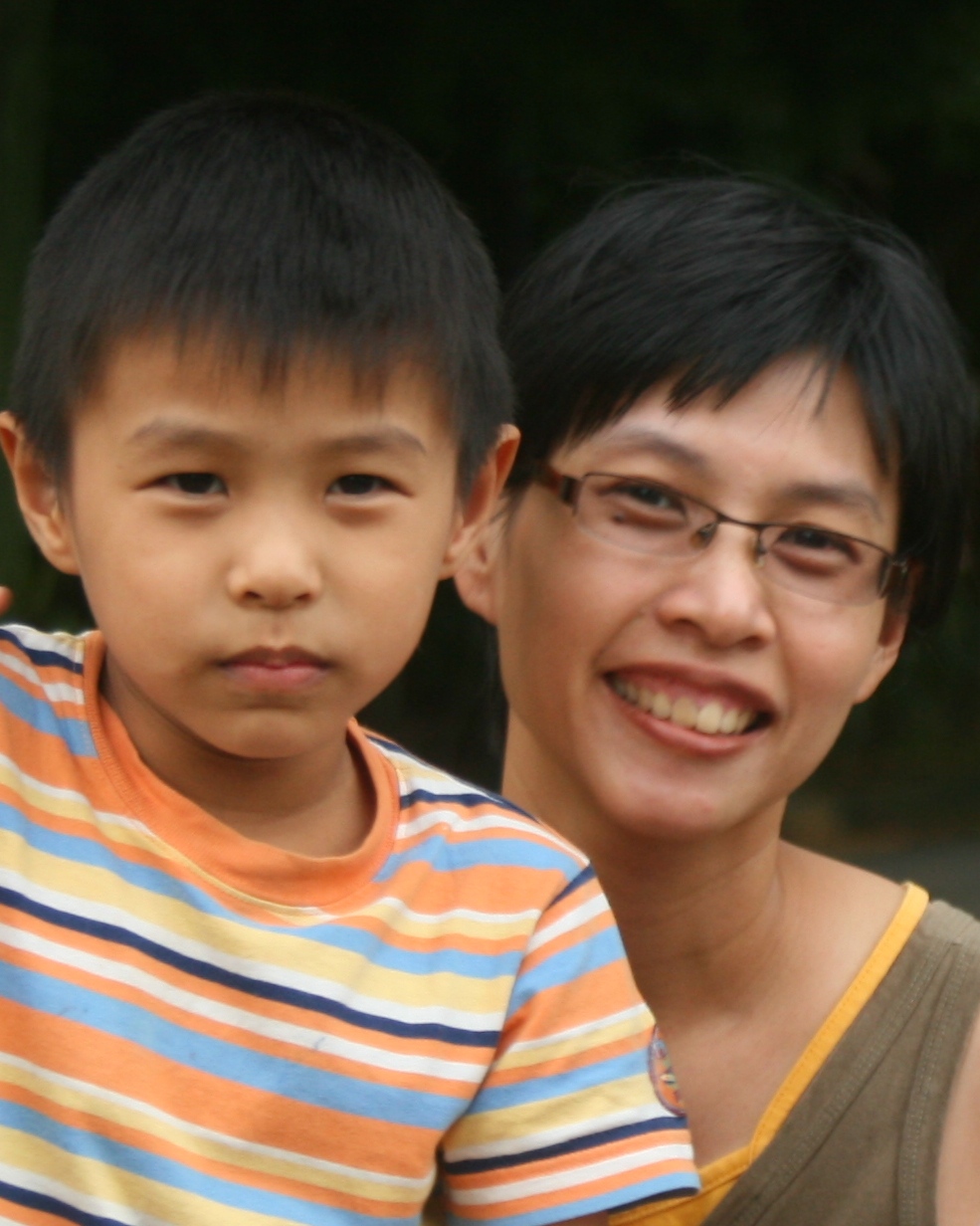Create a conducive environment.
A quiet environment is ideal for your child to complete his/her tasks. This is important because a child with ADHD is easily distracted. Make sure that the space created for your child’s learning purpose is free from noise pollution such as toys in sight. This way your child will be able to focus on completing his/her task(s).
Back to top
Having An Autistic Brother
Having An Autistic Brother
Written by Brenda Tan
I have two children. Ethel, now 5, has so much to say. Calder, 8, is autistic.
Ethel was born before Calder was diagnosed as moderately autistic. This is a very good thing because autism is believed to be partly hereditary. Like many other parents, we would have had second thoughts about begetting another child if the first one is autistic. So, Ethel is a present. A present for me because she enables me to experience "normal" parenthood. A present for Calder because she is his only friend, a friend who cares enough to pray for him.
It is not easy to be Calder's sister. Although she is younger, she is expected to give in to her brother because he is easily upset and difficult to pacify when upset. Being Calder's sister means having to watch Calder's mood before expecting an outing, having to give up many outings, having to hurry home when Calder gets agitated.
Ethel is so used to these that we could actually ask her, "Do you think we can go out today?" and she would look at Calder with his flustered face and desperate chanting and pronounce, "No, I don't think so."
I give talks on my parenting experience. Once, a member of the audience asked, "Is the sister deprived because she has a brother with Autism?"
In a way, yes. Ethel is deprived of her rights to be childish. Because her parents have their hands full dealing with the brother's meltdowns, tantrums on her parts are never well-tolerated. She knows she cannot hoard her parents' attention because Calder gets upset when ignored. And when Calder is moody, the atmosphere is tense, and parents speak sternly not only to Calder but to her too. She has to learn not to take these personally.
She has to learn to grow up quickly. As a result, she is a precocious 5-year-old. One of her preschool teachers actually told me, "In all my years of teaching, I have never come across a student as sensible as Ethel."
Frankly, I think when a family has a child with special needs, the person who gains the most is the sibling. Caring for a special-needs person builds a compassionate nature. If I am an employer, I would advertise for siblings of people with special needs because this is where you find responsible and kind staff.
Of course, I have also heard of the opposite effect: resentment and bitterness and defiance against what the sibling sees as unfair parenting.
In my case, my children are fortunate because I work part-time. And I have arranged their schooling such that I get to spend time with them individually. Ethel goes to morning school while Calder's school starts in the afternoon. This grants me many opportunities to show I love them.
I believe that when children feel loved, they would grow up well, whether or not they have special needs.
The above article was first published on KiasuParents.com in Feb 2013. The author Brenda Tan wrote a book “Come into my world: 31 stories of Autism in Singapore” which is available in both English and Mandarin. The book is sold in autism schools and a few cafes. To find out more, visit www.come-into-my-world.com .
Back to top
LOSING CALDER
LOSING CALDER
Written by Brenda Tan
My 5-year-old son is like a balloon. If you let go of him, he will float away.
He is always moving. If he sits, he rocks his chair. If he stands, he shifts from one leg to another and often stumbles onto other people’s feet. Even when you hold his hand, he swings like a pendulum around you. Imagine what happens when you let go.
I let go once and thought I'd lost him forever.
It was at Hougang Green, a neighborhood centre of stores. I brought him with me to a coffeeshop to pack lunch. He was pulling my hand as usual, wanting me to move on. Instead of struggling with him, I let go and turned to point at the dishes I wanted for lunch. When I turned back, he was gone. Alas, the stall owner took his time to give me my change. Could he not see my frantic glances?
“Calder!” I called.
I walked on. He loves to watch swinging doors. Perhaps he was at the supermarket, at the door where the butcher walked in and out. Perhaps he was enjoying the sight of the many cups of yogurt and the Yakult drinks. No, I did not see him at the supermarket. There was no telling, though, that I had not missed him while walking my direction.
Was my boy feeling lost, not finding me in this crowded place? Was he walking on and on, feeling more and more frightened?
“Sorry, have you seen a boy in green?” I asked the aunties and uncles around. No. Oh how I wished I had a picture of him that I could show to these people.
Perhaps he was in front of a lift, jumping in excitement as it opened and closed. I decided to check out the lifts of the nearby flats. No, he was not there. Could I have missed him while walking towards the lift?
Oh Lord, have I lost him for good this time?
My steps became a prayer. Help me, help me please, Lord, help me please.
I imagined someone finding Calder and asking him if he’s lost. Calder would beam at this person for the special attention he’s getting. If the person asked Calder his name, Calder would say: “My name is Calder!” (he had been trained to do this) only it may come out too quickly and garbled to be understood. Then the person might ask: “Where is your mommy?” Calder would then point in a general direction in front of him and exclaimed “Over there!” That’s about all the language he had for a situation like this.
If my 2-year-old daughter cannot find me, she would cry immediately. Then somebody may see and try to help. My boy, however, would probably walk on and on. As a result, nobody may stop him to help.
Could he have taken the route home? He would have to cross the road! He wouldn’t know to watch for cars. He could get knocked down!
Oh Lord, have I lost my boy for good this time?
Because Calder is autistic, I’ve always felt like I’d lost him. When he was younger, you could call and call his name and he would carry on like he hadn’t heard you. Right now, the problem is he doesn’t seem to understand what we say to him.
No sign of Calder. Do I finally call my husband and set off family alarm?
Let me go back to that coffee shop again. Walking from the opposite direction, I finally saw what I missed the first time.
Calder was behind a pillar in that coffeeshop. He was not frightened. In fact, he looked very happy. He was playing with the tap at the sink, and bouncing up and down in excitement. The front of his shirt was all wet.
“Calder! Mommy was so worried looking for you!”
There was an uncle watching him in amusement. It’s the poh-piah seller, whose stall was just beside that sink. “He has been here a long time,” said the poh-piah man. “Yes, I’ve been searching for him for a long time,” I replied.
Ten minutes are too long to lose a child.
I changed Calder’s shirt and walked him home. All the way, I felt the whole width of his hand and told myself that I must never ever let go of him again.
My elusive Calder. My fly-away boy.
A few days later, I bought both my children stainless steel necklaces and dog tags. The dog tags were engraved with my handphone number.
The above article was published in NTUC Lifestyle magazine two years ago. Author Brenda Tan wrote a book entitled “Come into my world: 31 stories of Autism in Singapore”. This book is sold in autism schools and a few cafes. A Chinese edition of the book is also now available. Click here to see the poster. To find out more, visit www.come-into-my-world.com .
Back to top
SURRENDER!!
SURRENDER!!
Written by Brenda Tan
We had to break the news.
“Calder is autistic.”
We announced this after every one had eaten during the birthday celebration of my mom and Calder, whose birth dates are two days apart.
My mom’s expression was one of puzzlement. Autistic?
“It means he may never attend normal school.”
Her countenance fell.
My son Calder was three years old when we decided not to wait any longer for him to start talking. Following the doctor’s advice, we had him assessed formally at KK Women’s and Children’s Hospital. The test took more than two hours and comprised observation and parents’ answers to questionnaires.
Unfortunately, Calder did not cooperate with the psychologist. Instead of following her instructions, he was more interested in playing with the window blinds. Then he did something he had never done before: he lay on the floor and spun himself like a fan. The verdict: moderate autism.
So autism is the reason why he didn’t respond when we called his name. Autism is the reason why he appeared deaf to our words. And later, autism would explain why everything must take place in a certain order, and why he flaps his hands like a chicken when excited, why he makes sounds like long yawns when he is enjoying bus rides. Autism makes him weird but nothing beats the idea that he would never be able to attend mainstream schools.
If you are a parent, your goal for your child would probably be to see him or her through PSLE, O’levels, A’levels. Of course, it would be great if your child can make it to university. And when your child has graduated, you hope he or she would get a good job and marry a good spouse. When I found out that Calder is autistic, I got lost because the normal route had somehow vanished.
Of course, there are parents who put their autistic child in mainstream schools. The child may struggle socially and academically but what’s most important to them is that this child spends time among normal children and learns to behave like one. Other parents hesitate to put their autistic child in mainstream schools because they fear the child would be singled out for his or her oddity and be mercilessly bullied.
I belong to the latter group of parents. Especially so since Calder’s language, even now at six years old, does not extend beyond the basic like “give me apple”, “go to sleep”, “take train”. I am worried because he would never be able to tell me if he’s bullied. Besides, for a child who does not know how to gargle despite two years of teaching, he is not going to be able to cope with weekly spelling tests. I know of parents who use the cane to make their child learn spelling well. Imagine being that child!
Still, it is hard to give up the dream of a promising future for Calder. And in Singapore, “good future” is equated with educational qualifications. So I turned my attention to Pathlight School, the only autism school in Singapore that trains its students for certifications like PSLE and the O’levels. Since it specialises in autism, I can trust it to protect my child from bullies and other discomfort that a neurotypical person may not be aware of. It seems to be the best of both worlds. Unfortunately, it is so popular that you need to achieve an IQ of some 75 to 80 to qualify.
It became my mission to train Calder to be “smart” enough to enter Pathlight School. I engaged tutors and therapists to help him, I made him many laminated books so he could memorise his address, memorise the definition of occupations, recognize the function of various tools etc. Every evening, my husband and I took turns to teach Calder for one hour, hoping he could absorb all the knowledge in time for his second psychological test. This is the TEST which would determine whether or not he would be pursuing educational certificates like other children.
Shortly before his sixth birthday, Calder took this test. I had prayed that he would be a good boy and cooperate with the psychologist. He was a good boy and did his best. But his best was not enough. He could not understand what was required of him. The psychologist wanted him to arrange blocks according to a given picture but he kept putting the blocks directly onto the picture. And when he managed to get the formation right, the psychologist wouldn’t stop the timing (yes, timing was recorded) until he had aligned his blocks parallel to the picture.
He could name colours and shapes but he could not answer the question, “How many legs does a bird have?” At this point, so early into the test, the psychologist said she would not give him an IQ score because of his extreme marks (near full marks versus near zero marks). But there were so many things we had taught him that had not been tested! Like counting. Counting is a learned concept and not a part of IQ, said the psychologist. But later she tested him on alphabet! She asked him, “What is your full name?” He gave the right answer, but then she said: it sounded scripted (of course, how else does he learn?!).
He is not going to be able to cope in Pathlight, she said. No, do not write him off yet, I beseeched, please carry on with the test and see how well he can score. It will get harder, she warned, and it did. The tasks she subsequently gave were impossible ones – bird is to worm as squirrel is to acorn, for example. Or rain is to umbrella as sun is to sunglasses. How is my Calder supposed to know such things? He is barely interested in them! The test became a nightmare not to show how much he knew but how much he didn’t know, like a set-up to convince me my son couldn’t make it. My husband and I shook our heads at each other. Nonetheless, I was very proud of Calder for staying seated and tackling these ridiculous questions with a smile.
At the end of the session, I was ready to raise both hands - I SURRENDER! I surrender my hopes of him entering Pathlight! I surrender my dreams of him qualifying educationally like other children! I surrender the certain future of a good job and a good spouse for my boy!
I seem to have failed in my goals for Calder but now that I have failed, the goals get replaced by perhaps more worthy goals – that he grows up happily, for instance. That he learns at his own pace.
The next morning, when I greeted Calder “Good Morning”, what I saw was no longer a boy who could never catch up. I saw a free spirit, free to learn happily, free from the rat race. So I was sad but at the same time relieved.
Perhaps, at the end of the day, Calder is going to be the one to have lived a truly fulfilled life after all.
The above article was first published in Today’s Parents. Author Brenda Tan wrote a book entitled “Come into my world: 31 stories of Autism in Singapore”. This book is sold in autism schools and a few cafes. To find out more, visit www.come-into-my-world.com .
Back to top
THE GOOD LIFE
THE GOOD LIFE
The Good Life has usually been interpreted as having wealth, education and comfort, but many have not got it, especially in Africa and Indonesia. The Good Life is also generally regarded as having health, peace and love.
The Good Life has been dreamed specifically as a life of “seeking happiness” --- whether we have got it permanently is again another matter. What then is the Good Life?
My short and simple answer is that the Good Life is life that does good works.
We may dream great dreams or have wonderful ideas, but the truth is that in any dream, efforts are needed to actualise it. As the saying goes, “Faith without works is dead!”
Also, thinking and contemplating about love is not love. Love need to be conveyed or passed on from one person to another in actions, in good works. To tell someone, “I love you “, and then do nothing to help or take care of the person in need, or is in suffering, is not real love; it is only dream-love, a sort of a fairy tale love or “petty love”, very much of the airy-airy form!
To seek happiness for our own self as in the process of withdrawing into our inner peace and also withdrawing from the world, is again not exactly “living the Good Life”. We should contribute to society: to help the weak and sick, to visit the orphaned, the elderly and the widowed. In doing good works, there will be delays, detours and dead ends… along the way. Be ready for all of them; don’t give up, for we are not just merely seeking happiness for ourselves! Continue to hope and persevere.
Be in good spirit, cheer and smile. That then is the Good Life. That is what I mean by doing good works. There is Joy, Grace, Hope and Love in the Good Life.
In Joy, we see Passion. In Grace, we see Charity. In Hope, we see Purpose. And in Love, there is Meaning. I earnestly exhort you to live and have the Good Life.
Have you heard or got the “Calling”?
Back to top
PUSHING THE FRONTIERS...
PUSHING THE FRONTIERS...
When new ideas are introduced and new projects are proposed, we are often held back by fears and doubts. The most common “blockade” is: It’s something that has never been tried out before! We have the tendency to look forward to other countries to see whether others have done it before; and if it has been done, we feel “safe to copy” what has been done!
However in real life, yes often, we are confronted with some deep-seated problems, and we know something ought to be done to solve the problems or to remove the obstacles. BUT, the big “but” is that we feel helpless and alone. Worst of all, we are paralyzed in our hopeful intentions because of the lack of financial funding to support our cause.
So what should we do? Sometimes, we need to challenge existing laws and improve on them. It is not just sitting there to wait for a change in mindsets. We need to push the frontiers. To push the frontiers, we need to speak out boldly, assertively and persistently but not aggressively.
Take for example, the action by Prof Tommy Koh, the former Ambassador to the United Nations. He is trying to give a better lot to the underpaid, to help lift up the underprivileged. He suggested introducing the Minimum Wage Policy in Singapore, just as what Taiwan and Hong Kong have just done. He is pushing the frontiers. The policy will lift up the income of the lowest 15 per cent of the population; it will not affect the wages of the other 85 per cent, and so it is not correct to argue that companies will close down or relocate out of Singapore if the policy is introduced here. It does not cost the employers to pay out a lot of money!
Because the idea is new in this country, it is shot down. Prof Tommy Koh continues to push the frontiers; for he believes the policy will help people, especially for example, the poor among the mentally challenged or the elderly workers who found themselves displaced by the flood of foreign workers. The policy will reduce the huge income gap in Singapore and remove obvious hardships. It will reduce the number of people depending forever on government welfare. It will promote self sustenance and the financial independence of the individual. The poor will not continue to get increasingly poorer over the years, while the rich continues to rise and soar.
As our former Prime Minister Mr Goh Chok Tong has hope: We shall ALL aim to live the Good Life. The Good Life is not just for the top 20 per cent.
In my next article I shall share with you my personal ideas of a Good Life. Like some of you, I have a mental disorder, but I live the Good Life. For those of you out there, who have loved ones with mental challenges, be not despair. Together, WE shall push the frontiers!
Back to top
RISE TO THE OCCASION...
 RISE TO THE OCCASION...
RISE TO THE OCCASION...
In life, all of us have ups and downs. At times, our journey in
life may even be quite unpredictable.
At one of my lowest points in my life, I was put into the
forensic psychiatric ward. I was given sedation as well as Electro Convulsive
Therapy. A month and a half later, when my mental condition was better, I
“swore to myself” and prayed…
“If I ever do recover from this acute mental disease, I would
come back to help all of you who are warded here with me!”
It was sad. In the forensic ward, I saw patients talking to
themselves, pointing fingers at the air accusing their imaginary enemies,
sometimes laughing, sometimes crying in fears and sometimes shouting aloud,
throwing things. There must be a way to help these pitiful souls, to bring them
back from the brink of insanity. Surely better medication could be invented and
more effective social support could be devised or implemented.
Years later, with much blessedness, I really became well. I did not
rise to the occasion immediately --- to the promise I had given God. It took
many years for me to do that.
First, I wanted to be financially independent so that I could
pay for my own medication. In order to do that, I never gave up looking for a
job. I had worked in 15 types of jobs in 15 years.
Then, I was introduced to a lovely girl to whom I got married,
and together we set up a nest and bought our 4-Room flat.
Next, I started teaching full-time, and I also shared my
experiences of recovery to help others. I gave talks in many mental wellness
organizations and centres. At the same time I attended a lot of seminars and
mental health courses, some of which were attended in Chicago through NAMI and
Thresholds.
Then, I started to facilitate Interactive Support Groups. I
still do individual coaching on how to cope with the sickness, so that the
consumers will not go through multiple relapses anymore. This helps to stop
their “revolving door cycle” --- repeated endless re-admissions to hospitals.
Now, I write not only books but also on the internet. I have
also given talks at world psychiatric conferences. I am not rich. I hold no
high career position in society. I am just like one of you, but I am glad I have
risen to the occasion: many have received help and recovered, and feel blessed
through reading my books and talking to me privately. I know my mission and I
feel good that I do walk the talk
faithfully.
Back to top
SINGAPORE IS NUMBER ONE!
SINGAPORE IS NUMBER ONE!
We are all aware of the challenges faced by children and adults who have mental health difficulties. They may have autism, dyslexia, attention deficit disorders, dyspraxia or other mental disorders. However, have we honestly ask the question, “Can these children or adults also rise and soar?”
Singapore is number one in many areas. We have the best airport, the best airline, the best Integrated Resort in Asia, the best scholarships and scholars, and our government is highly regarded and considered the most efficient and forward looking. We are indeed a blessed nation, with the highest financial reserve. In education, we provide our children the best. As a nation and as a people, we have risen high and soar.
Recently in the Commonwealth Games, our sportsmen and women had done us proud. Many medals were won. But what about us who have mental health difficulties?
For a very long time, I have seen the need to help this section of the population. We can help them not only to be able to look after themselves, to be financially independent and to have a job. We can also help them to rise and soar and be number one, just like our scholars, sportsmen and our airline.
I know I cannot compete with the best in the company-job environments, where productivity, speed and stress-tolerance are highly value. For myself, and like some of you out there, I have an inherent mental disorder. When I was young, I was educated at Raffles Institution, but my university education was stopped by my chronic schizophrenia during my fourth year in Civil Engineering. I know the value of education. I know the potential of everyone to be able to soar and rise.
I had struggled working as an administrative officer despite my sickness. I had also worked as a cargo container warehouse supervisor. However, the stressful environment defeated me. I could not take the long hours and the night shifts. When I got married, my wife helped me on my journey to identify my true talents. We believe every individual is gifted in a certain way or in a certain field. All we need to do is to spot our talents and move along in that direction.
I quitted working for commercial business companies where the competition was keen and stressful. Instead I have chosen to teach, facilitate support groups for the mentally challenged, give talks on mental wellness and also to write books. These are areas where my potential is. Today, I have already written three books, one of which has become so popular that it is translated into Chinese, Bahasa Indonesia, and Korean. It is also available in Braille. Soon, I will be publishing a short fiction, and later, my collection of more than a hundred poems and quotations written over many years.
Yes, with the support of all of you out there, with the support of the government and all the mental wellness organizations and institutions, we can also soar and be number one. We may have mental health obstacles, but those obstacles will not be able to defeat our potential. Again I say again, we all have hidden talents. All we need to do is to identify them and develop them to their full potential. Some called the process “passion”, while others describe these talents as “the gifts of God”. Whatever the terms we use in our description, it matters not. What is crucial is to ponder and probe, “Can we launch into our mission in life?”
In conclusion, I wish to ask, “What is your Mission?”
Back to top
ASSESSMENT AND INTERVENTION CENTRES – SPECIAL NEEDS

